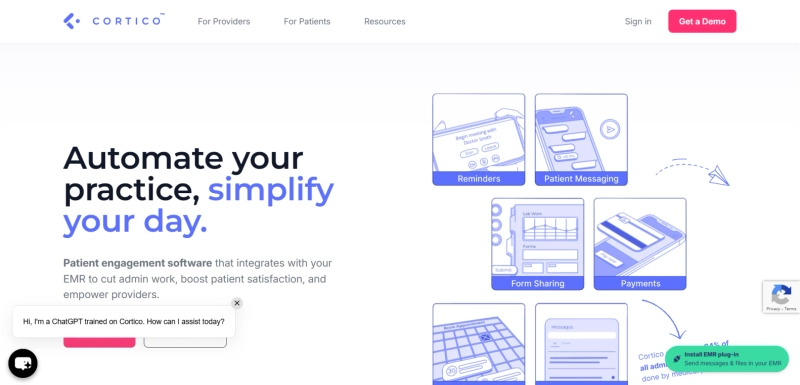In today’s fast-paced healthcare environment, communication is key to ensuring optimal patient care and streamlining medical workflows. Healthcare providers face mounting pressures to improve both the quality and efficiency of care while maintaining strict compliance with privacy regulations. This is where healthcare communication platforms come into play.
A healthcare communication platform is designed to facilitate smooth and secure communication between medical professionals, patients, and administrative staff. The platform integrates multiple tools, creating a cohesive system that enhances collaboration, reduces errors, and supports better patient outcomes. Here are the key features that define a robust healthcare communication platform.
1. Secure Messaging
At the core of any healthcare communication platform is secure messaging. Medical teams need to communicate quickly and confidentially about patient care. These platforms offer encrypted messaging features, ensuring that all communication meets HIPAA (Health Insurance Portability and Accountability Act) requirements. Secure messaging allows for the exchange of sensitive information without the risk of data breaches, fostering trust and confidentiality.
2. Integration with Electronic Health Records (EHR)
Seamless integration with Electronic Health Records (EHR) is essential. A healthcare communication platform should allow healthcare providers to access and update patient records in real-time, directly from within the communication system. This integration minimizes the risk of errors, saves time, and ensures that patient data is always up to date, improving the accuracy of care and enhancing decision-making.
3. Appointment Scheduling and Reminders
Efficient scheduling and timely reminders are crucial in healthcare, where missed appointments can delay treatment and disrupt workflow. Healthcare communication platforms often include features for scheduling appointments, confirming visits, and sending reminders to patients. These reminders can be sent through text, email, or app notifications, reducing no-show rates and ensuring a smoother process for both patients and staff.
4. Telemedicine Capabilities
Telemedicine has become an integral part of healthcare, especially post-pandemic. A healthcare communication platform often includes video conferencing tools, allowing for virtual consultations between doctors and patients. This feature is invaluable for providing care to patients in remote locations or those unable to attend in-person visits. The integration of telemedicine allows for real-time diagnosis and treatment plans, increasing access to healthcare while reducing the burden on physical facilities.
5. Collaboration Tools for Healthcare Teams
Collaboration among healthcare professionals is essential for providing comprehensive care. Healthcare communication platforms facilitate this by offering features such as group messaging, file sharing, and task management. These tools help teams collaborate on patient cases, share important updates, and coordinate efforts, leading to more efficient and coordinated care delivery.
6. Patient Portal Access
A patient portal is an important feature of many healthcare communication platforms. It provides patients with access to their medical records, test results, and medication prescriptions. Through the portal, patients can communicate with their healthcare providers, ask questions, and request refills, empowering them to take an active role in their healthcare journey. This feature increases patient satisfaction by offering convenience and transparency.
7. Real-Time Notifications and Alerts
Timely notifications and alerts are crucial in healthcare, where quick responses can make a significant difference in patient outcomes. Healthcare communication platforms provide real-time alerts about critical lab results, urgent patient updates, or changes in treatment plans. These notifications can be sent directly to the relevant healthcare providers or departments, ensuring that necessary actions are taken promptly.
8. Task and Workflow Management
Healthcare settings are highly dynamic, with numerous tasks and workflows to manage at any given time. A communication platform often comes equipped with task and workflow management features that help staff track tasks, set deadlines, and prioritize patient care activities. This helps reduce delays and ensures that nothing falls through the cracks in fast-paced environments.
9. Analytics and Reporting
Healthcare communication platforms often include built-in analytics and reporting features, allowing healthcare organizations to track key performance indicators (KPIs), patient satisfaction, and workflow efficiency. These insights can guide decision-making and help organizations identify areas for improvement in their communication and care delivery processes.
10. Mobile Accessibility
The ability to communicate and access healthcare information on the go is a must for healthcare professionals who are often on their feet or in different areas of a hospital. Many healthcare communication platforms are designed to be mobile-friendly, providing secure, remote access via smartphones or tablets. This ensures that providers can stay connected and informed regardless of their physical location.
Conclusion
Incorporating a healthcare communication platform into a medical practice or hospital system is essential for streamlining communication, improving patient care, and enhancing overall operational efficiency. Key features such as secure messaging, EHR integration, appointment scheduling, and telemedicine capabilities are pivotal to creating a unified, responsive, and effective healthcare system. As healthcare continues to evolve, these platforms will be instrumental in ensuring that both healthcare providers and patients can communicate seamlessly and securely.
By implementing a well-rounded communication platform, healthcare organizations can reduce errors, boost productivity, and ultimately, improve patient outcomes. Whether it’s enhancing collaboration, managing workflows, or providing telemedicine services, a healthcare communication platform is an indispensable tool in modern healthcare.


